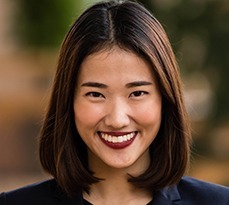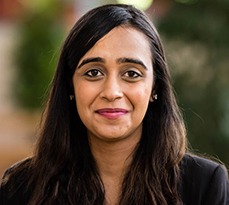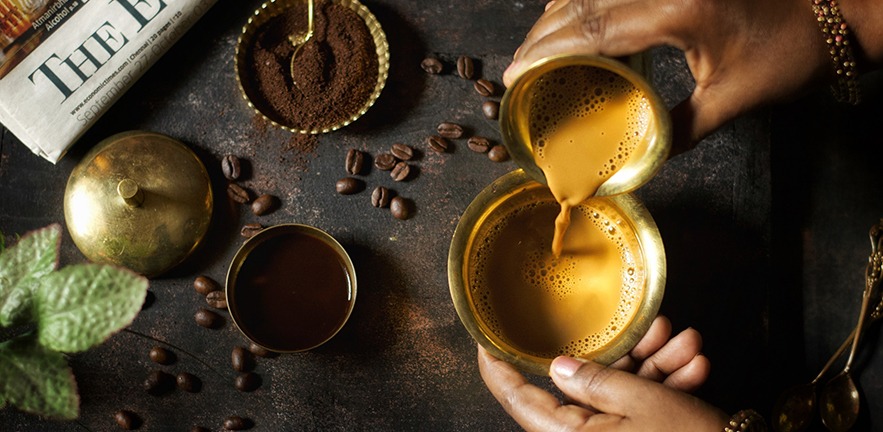The Cambridge entrepreneurs embracing change in a cold COVID-19 climate.
It wasn’t part of his plan to launch a startup just yet, let alone when everyone was curtailing their discretionary spending in an economy buffeted by turbulent times during a pandemic. But when Nahush Sathe, Cambridge MBA alumnus 2017 and coffee aficionado, saw an opportunity earlier this year, he decided on an entrepreneurial escapade alongside his career path in the Tech sector.

“In the summer of 2020 with the world thrown out of gear I ran out of my daily brew in London. Kaapi is a revered filter coffee from certain regions of India, which I had tried to buy online but found impossible to source easily, without paying an exorbitant price in the UK.
“No one was travelling and that’s when I realised that thousands of other people in the UK could be facing the same problem,” says Nahush.
Sipping the difference of Kaapi
With its distinctive rich flavour, a steaming tumbler of filter kaapi has for generations been the sig-nature drink of Southern India, where most of the nation’s coffee is produced.
It’s a beverage imbued in tradition and ritual; from the chicory blended coffee to its slow brew and serving style, using swished-up scalding milk for a foamy finish. Unlike the more famous chai, however, South Indian filter coffee has remained in the background of the globalised drinks market.
As COVID-19 travel restrictions remained in place for the foreseeable future, Nahush identified a supply gap within the UK’s huge Indian diaspora, looking for the comforting daily ritual of kaapi and a familiar taste from a land now out of reach.
“What sets filter kaapi apart is the nostalgia it can evoke, the association with home, and of course its flavour. I enjoy a cappuccino as much as the next person, but I have been drinking kaapi for years now. It is something I start my day with and if I don’t have access to it then it doesn’t feel right.
“This started me thinking about setting up a business for this niche market of people who know the product but who, like me, cannot access it easily in the UK.”
MBA talent steps up for startup
To build a team to drive the new venture, Nahush turned to the known capabilities of his Cambridge MBA cohort, class of 2017. Khushboo Gandhi and Nim Wichienkuer agreed to become co-founders of Indian Kaapi Company based in Cambridge.

Nim, Product Director at Beauty Labs International, led the market research to test the product’s potential. Khushboo, with her marketing experience in India and in the UK, lent a unique perspective on pushing the concept in the UK.
“I was not a coffee drinker and I heard of kaapi for the first time from Nahush. I was concerned about just how much interest there would be for such a niche product in the UK. We tested the traction and demand for the product and the feedback was good. We are surer now of the potential to scale-up this business,” says Nim.
Taking on the key role of mentor is another Cambridge MBA alumnus and co-founder, Hamza Mudassir, Cambridge Judge Visiting Fellow – Strategy, who recruited the trio initially into Adstream after graduating in 2018.
“Hamza brings with him an immense amount of experience of working across multiple functional areas and transforming businesses. Moreover, he has put us in touch with people from the MBA programme who have started their own ventures and who now run successful multi-million-dollar businesses. So, there was always the opportunity to share insights within this invaluable network,” adds Nahush.

Kaapi’s short runway to UK launch
By late October, with the agility of seasoned entrepreneurs, Indian Kaapi Company was taking orders in the UK for authentic South Indian filter coffee, sustainably grown single-origin coffee and traditional brass brewing kits.
“From conception to our first trade was probably a little over two months. From the point in time when we knew we were serious about the idea to selling our first brew was approximately forty-five days. It has been quite a hectic journey,” says Nahush.
A detailed knowledge of the South Indian coffee industry ensured an accelerated turnaround to market.
“We were able to set things up quickly and efficiently because Nahush already knew the product really well. He had contacts with suppliers and access to good logistics providers. We were not making a bet here because we knew we were going to get a high-quality product,” Nim adds.
She believes the trust in each other’s abilities, after their time together in Cambridge and subse-quently at Adstream, as well as their complementary skills within the team, brought fast decision making and a resulting smooth launch.
“What’s been very helpful in driving this forward are our productive working relationships. We have known each other for quite some time now, so we can be really frank with each other.”
From crop to cup, the company emphasises its commitment to sustainability and is transparent on the sourcing of its products. The filter coffee is cultivated at high altitudes on the slopes of the Western Ghats in South India, where the fertile soil and cool temperatures allow the coffee to develop a rich flavour. The single-origin coffee is predominantly shade-grown on wildlife-friendly estates with minimal environmental impact. Their packaging is sustainable throughout, down to the tape used to seal parcels.
The Cambridge catalyst for entrepreneurial ambitions
For Nahush, now Head of Pricing at THG Ingenuity, London, the need to work full-time on the company coincided with a short redundancy period as a result of the COVID-19 crisis.
“The ability to pivot quickly and establish a new venture like Indian Kaapi Company, comes from the entrepreneurial ethos that is embedded throughout the Cambridge MBA programme,” he says.
“I think there is an entrepreneurial mindset throughout the Cambridge Judge Business School that is driven not only by the faculty, but also by the cohort. There is this enormous sense of collaboration that I have now experienced firsthand. It is not just a buzzword.
“When the time came to start something new, the skillset and network Cambridge Judge provides made me totally believe that I could do this,” Nahush adds.
What’s next for the still thirsty entrepreneurs?
The team’s focus remains firmly on broadening product awareness within their primary market, the UK’s 1.4 million strong Indian community. Kaapi will also target coffee enthusiasts who are open to exploring other cultures through food, or who want to try different ways of brewing coffee.
“We are always striving to achieve fast yet sustainable growth. We are a bootstrapped venture being run in a frugal way, and we have plans to take kaapi to the next level in 2021,” says Nahush.
Beyond that, Nahush and Nim highlight the team’s continuing success in cementing collaborative working relationships, despite the pressures of building up a new enterprise and the ever-present possibility of failure that entrepreneurs face.
Indian Kaapi Company is to be the first among many entrepreneurial escapades this dynamic MBA alumni team plan to brew up together.


